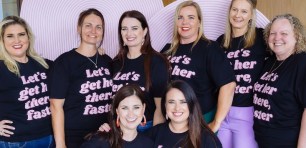
Christina Hobbs is a co-founder of Verve Super. Source: Women's Agenda
This week my daughter’s childcare centre will be closing for a day of industrial action. It’s another day this year that I will be canceling meetings; delaying urgent work; and juggling care with my husband. To be honest, it’s the absolute least that I can do.
I’m the female CEO of a business that I co-founded with two other women in an industry, fintech, where 98.5% of similar companies are founded by men.
The rarity of women in my position makes me a regular figure on podcasts and speaking circuits, and I’m asked at least once a week that question of: “How did I do it, how did I get to where I am now?”
There’s so much about my privileged life that’s helped me get to the position I am in today, but a large part of my success, where other women have stumbled, is simply due to meeting my husband at 38 and not having my first child until I was 39. I’ve never had to make tough choices between career and care.
But now, after recently battling through a challenging pregnancy, returning to work full-time with a three-month-old, and having almost made it to the end of her first year — the question of how I got here seems irrelevant, instead I’m most interested in answering: “How have I managed to stay?”
I can thank my husband, supportive co-founders, and our amazing team who held the fort in my absence. But the reality is, it’s the poorly paid labour of other women that physically allows me to sit down at my computer most mornings. Women (yes, at my daughter’s childcare centre they are all women), who by choice or necessity, work in the important, highly skilled, yet appallingly paid, industry of early childhood education.
Last week at the National Jobs and Skills Summit, we finally had acknowledgement from our political leaders of the absolute obvious: that professional women like me could help solve the nation’s skills shortage if there was more affordable and accessible childcare to allow us to work, and that key to this is having more childcare workers and educators.
Yet, according to the United Workers Union, it’s these very childcare workers and educators that are leaving the sector in record numbers every week, due to burnout, high workloads and low pay.
Who blames them?
What the summit somehow missed, is that the value of early childhood educators isn’t just to allow women like me to contribute to our society. In their own right, these workers and educators have hard complex jobs that are incredibly important. They care for and educate our children, they are responsible in large part for the wellbeing of future generations.
The American feminist and working-class activist Barbara Ehrenreich, who passed away this week, had a term for poorly paid, yet highly skilled workers, like early childhood educators. She called them: our society’s greatest philanthropists.
Through their manual labour, they sacrifice their health without the income to support expensive therapies. Through the patience and energy they give our children each day, they in many cases go home exhausted to their own families. And as the founder of a superannuation fund tailored to women, I know full well that in many cases these (mostly) women workers will not earn enough for a comfortable retirement. Their donation to our society will continue long after they stop working.
It’s time to end the forced philanthropy. Our largely female early childhood educators deserve fair pay and conditions.
That’s why today, I won’t be staying at home with my daughter quietly. I’ll be taking her to Federation Square in Melbourne, standing alongside her carers, and demanding better pay and conditions for women who give so much.
This article was first published by Women’s Agenda.
Handpicked for you

How a new VC fund plans to help Aussie women founders access money for their businesses



COMMENTS
SmartCompany is committed to hosting lively discussions. Help us keep the conversation useful, interesting and welcoming. We aim to publish comments quickly in the interest of promoting robust conversation, but we’re a small team and we deploy filters to protect against legal risk. Occasionally your comment may be held up while it is being reviewed, but we’re working as fast as we can to keep the conversation rolling.
The SmartCompany comment section is members-only content. Please subscribe to leave a comment.
The SmartCompany comment section is members-only content. Please login to leave a comment.